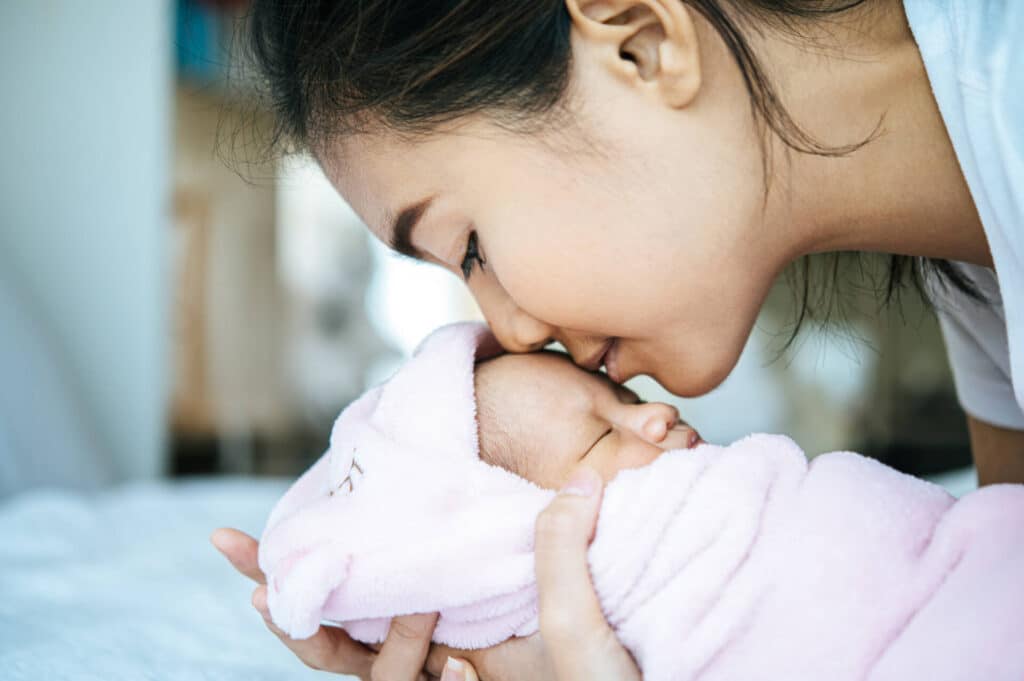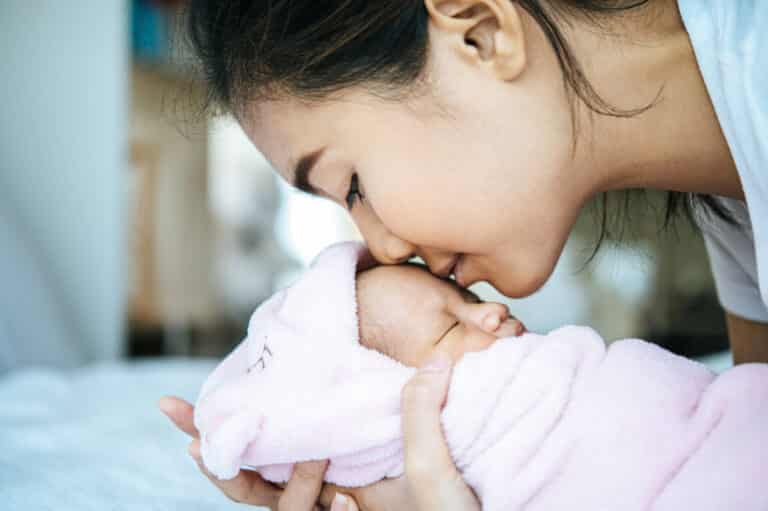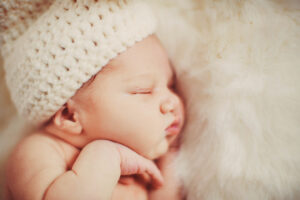
When a new baby is born, it’s natural for friends and family to want to shower them with love and affection. However, when it comes to kissing a newborn, it’s important to exercise caution. While a kiss may seem harmless, it can actually be dangerous for a newborn’s health. In this article, we’ll explore why kissing a newborn can be risky, and what parents and caregivers can do to protect their little one.
The Risks of Kissing a Newborn
Newborns have an immature immune system, which makes them more susceptible to illness and infection. Kissing a newborn can expose them to harmful bacteria and viruses that can cause serious health problems. In particular, the herpes simplex virus (HSV) can be easily spread through kissing, and can cause a potentially life-threatening condition called neonatal herpes.
Neonatal herpes is a rare but serious condition that can occur when a baby contracts HSV during the first few weeks of life. Symptoms of neonatal herpes can include fever, irritability, poor feeding, and blisters or sores on the skin or in the mouth. If left untreated, neonatal herpes can cause serious complications, such as brain damage or even death.
In addition to HSV, other viruses and bacteria can also be spread through kissing, including the flu virus, respiratory syncytial virus (RSV), and streptococcus bacteria. These illnesses can cause serious health problems in newborns, including pneumonia, meningitis, and sepsis.
How to Protect Your Newborn
While it’s important to show your newborn affection, there are steps you can take to minimize the risk of illness or infection. Here are some tips to help protect your little one:
- Avoid kissing your newborn on or near the face, especially if you or anyone around them has a cold sore or other symptoms of illness.
- Encourage friends and family members to wash their hands before holding or touching your newborn, and to avoid kissing them.
- If you or someone in your household has symptoms of illness, avoid close contact with your newborn until the symptoms have passed.
- Consider limiting visitors during the first few weeks after your baby is born, to minimize the risk of exposure to illness.
By taking these precautions, you can help protect your newborn from illness and infection, and ensure that they stay healthy and happy.
Conclusion
While it’s natural to want to shower a new baby with love and affection, it’s important to be mindful of the potential risks of kissing a newborn. Newborns have an immature immune system, and can be more susceptible to illness and infection. By taking steps to protect your little one, such as avoiding kissing on or near the face, washing hands frequently, and limiting visitors during the first few weeks, you can help keep them safe and healthy. Remember, a little caution can go a long way in protecting your newborn’s health and well-being.
Understanding Fever Blisters and Kissing Newborns
What Causes Fever Blisters?
As mentioned earlier, fever blisters are caused by the herpes simplex virus, which is highly contagious. This virus is usually transmitted through direct contact with an infected person or through contact with their personal items such as towels, toothbrushes, and utensils. Once you are infected, the virus can stay dormant in your body for years before reactivating, causing fever blisters to appear.
The Danger of Kissing Newborns with Fever Blisters
Newborns have a weak immune system, which makes them more susceptible to infections. When you have a fever blister, kissing a newborn can expose them to the herpes simplex virus, which can lead to serious complications. In some cases, the virus can cause brain damage, blindness, and even death. This is why it is crucial to avoid kissing a newborn when you have a fever blister.
Protecting Your Newborn from Fever Blisters
If you have a fever blister, it is best to avoid close contact with your newborn until the blister has completely healed. This means no kissing, hugging, or sharing personal items such as towels, blankets, and clothes. You should also wash your hands regularly and wear a mask when you are in close proximity to your newborn.
To protect your newborn from fever blisters, you should also encourage everyone who comes in contact with your baby to wash their hands regularly and avoid close contact if they have a fever blister or any other infection.
Treating Fever Blisters
If you have a fever blister, there are several things you can do to speed up the healing process and reduce the severity of the symptoms. These include:
- Applying a cold, damp cloth to the blister to reduce swelling and inflammation
- Taking over-the-counter painkillers such as ibuprofen or acetaminophen to relieve pain and fever
- Applying a topical cream or ointment to the blister to reduce itching and promote healing
- Taking antiviral medications prescribed by your doctor to speed up the healing process and prevent the virus from spreading.
How to Prevent Fever Blisters and Protect Your Newborn
Fever blisters are not only painful and uncomfortable, but they can also be unsightly and embarrassing. To prevent fever blisters, it is essential to maintain good oral hygiene and avoid triggers such as stress, sunlight, and certain foods. Here are some tips on how to prevent fever blisters and protect your newborn from the dangers of this viral infection:
Maintain Good Oral Hygiene
Keeping your mouth clean and healthy is essential to prevent the herpes simplex virus from spreading and causing fever blisters. This means brushing your teeth twice a day, flossing regularly, and using a mouthwash to kill bacteria and viruses. You should also avoid sharing toothbrushes, utensils, and towels with other people, especially if they have a history of fever blisters.
Avoid Triggers
Fever blisters can be triggered by a variety of factors such as stress, sunlight, hormonal changes, and certain foods. To prevent fever blisters, you should try to avoid these triggers or take steps to reduce their impact. For example, if stress is a trigger for you, you can practice relaxation techniques such as yoga, meditation, or deep breathing exercises. If sunlight is a trigger, you should wear a lip balm with SPF and a hat when you are outdoors.
Boost Your Immune System
A strong immune system can help prevent the herpes simplex virus from reactivating and causing fever blisters. To boost your immune system, you should eat a healthy and balanced diet rich in vitamins and minerals, exercise regularly, get enough sleep, and avoid smoking and excessive alcohol consumption.
Treat Fever Blisters Promptly
If you develop a fever blister, it is essential to treat it promptly to reduce the severity of the symptoms and prevent the virus from spreading. You can use over-the-counter creams and ointments to soothe the blister and promote healing, or you can see your doctor for antiviral medications to speed up the healing process and prevent complications.
Protect Your Newborn
Protecting your newborn from fever blisters is crucial to their health and well-being. In addition to avoiding close contact with your newborn when you have a fever blister, you should also encourage everyone who comes in contact with your baby to follow good hygiene practices and avoid close contact if they have a fever blister or any other infection. You should also keep your home clean and disinfected, especially if you have other children or pets who may carry the virus.
When to See a Doctor
In most cases, fever blisters will heal on their own without causing any serious complications. However, if you experience frequent or severe fever blisters, or if your newborn develops any symptoms such as fever, lethargy, or irritability, you should see a doctor immediately. They can prescribe antiviral medications or other treatments to prevent complications and ensure your health and well-being.
Conclusion
Fever blisters are a common viral infection that can pose a serious risk to newborns. By following good hygiene practices, avoiding triggers, and boosting your immune system, you can prevent fever blisters and protect your newborn from the dangers of this viral infection. If you develop a fever blister, treat it promptly to reduce the severity of the symptoms and prevent the virus from spreading. By taking these precautions, you can enjoy a healthy and happy life without the discomfort and embarrassment of fever blisters.




